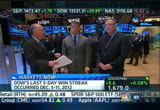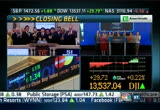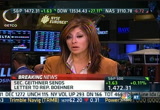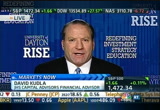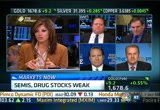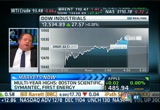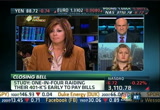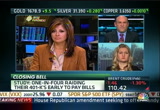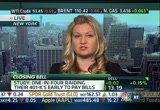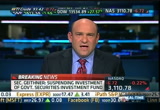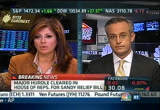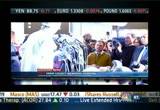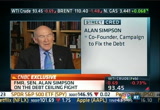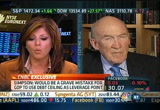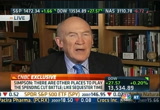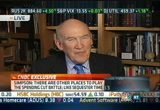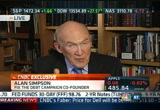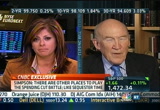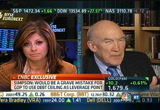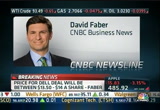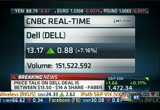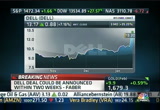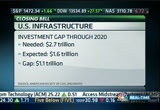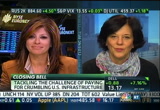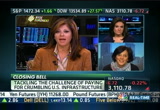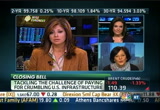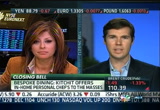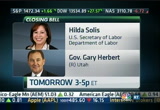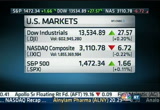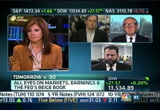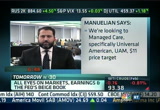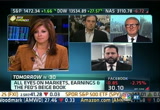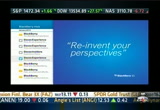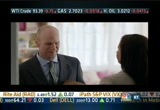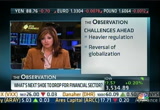tv Closing Bell With Maria Bartiromo CNBC January 15, 2013 4:00pm-5:00pm EST
4:00 pm
you've always established how bullish you are. long time trader terry dolan is back here. also bullish right now. are we looking at complacency at the low vix right now. >> i think so. i think the market is a bit complacent coupled with the volume not on the moves today but the dow has a lot of underlying strength and back up around the highs and a little bit above the highs we saw in september and then again in november and i think we have a good possibility of following it into tomorrow with the earnings coming up. >> yet you're still bullish. >> i am. >> you didn't tell us what you would buy here. what do you like? >> going cyclical growth. transports confirming a lot what have we saw. pmis rising and inflation all over the place. this year it's with cyclical growth, not defensive growth. not just getting paid to wait but it's cyclical growth right now. >> thank you, guys. >> good to see you. >> terry, welcome back. good to see you. >> the dow going out near the highs of the day, but, again, it's not setting the world on fire but some of the other averages are doing very well and it's just a day when apple is going to close below $500 a
4:01 pm
share for the first time in almost a year. the dow up 27 points. that's the first hour of the closing bell. here's the second hour now with maria. i'll see you tomorrow. >> and it is 4:00 on wall street. do you know where your money is? welcome back to the "closing bell." i'm maria bartiromo on the floor of the new york stock exchange. the dow jones industrial average closing higher today for a fifth session in a row. take a look at how we're settling out on the street tonight and the market does close at the highs of the afternoon and the dow is down 61 points earlier today. at the close, up 27 points. about a quarter of a percent higher at 13,534. nasdaq close but no cigar. down 6.75 points on nasdaq but it, too, had been worse off. 3110 last trade on the nasdaq. s&p 500 close to where it began the session with a gain on the day of 1.66 points. first, breaking news out of washington right now. >> we go to john harwood.
4:02 pm
>> reporter: maria, get used to drip, drip, drip. small development news like the one contained in this secretary treasury secretary geithner send to congress notifying them of one of the extraordinary measures he's taken to put off the hitting of the debt crying, not investing some money in the federal employee retirement system in order to preserve room against the cap on the debt limit. geithner notified house speaker boehner he and other treasury secretaries have done in other impasses, nothing profound about it, just an attempt to keep the pressure on the congress, remind them that the clock is ticking. we're getting closer to the debt limit as the president said yesterday. we could hit it in as little as one month, maria. >> john, thank you so much. we'll be watching that story certainly as will the markets. is the market too complacent right now with all of the stories out there as far as the u.s. debt as well as the global economy. according to rex macy it is. he thinks there's a good chance
4:03 pm
that risk fears will rise and, therefore, the market will pull back. will that be the moment for investors to get in. good to see you, gentlemen. thanks so much for joining us. what are you expecting in terms of this market 2013? >> sure. well, right now we're at 1472 on the s&p. we think it's going to go marginally higher from here, but it's not going to be a smooth ride. we've got a vix at 13 and change. that's too low. that's where the complacency comes from. you see it there. as we move into the debt ceiling debate, it can be far harder to solve than the taxes, we think the market can be down for a while, and before it comes back up. >> so you're looking for a decline, and perhaps that is an entry point for some. do you agree with that? >> i think any decline is an opportunity to buy, maria. i'm very, very bullish on u.s.
4:04 pm
equities and one of the main reasons i am the u.s. energy story which i think is a story that's not being told as well as it should be. in 2012 the u.s. oil production was up 16%. that was the biggest year over year increase in u.s. oil production since 18 at which just happens to be when we started producing oil so if we think about what's going on. we have right now -- right now we produce oil at 80%, the same price the rest of the world does. we produce natural gas at 25% of the price the rest of the world does. we have cheap energy here in the united states and we feel that will drive manufacturing back to the united states, create jobs, and when all this political stuff is over, that's going to be a big story that we'll talk about ten years from now. >> these are long-term projects. these happen over a long period of time. i think the point that rex is making we'll see a sizable decline, maybe not sizable, i don't know what kind of size you're expecting because of all the wranglings in washington. what you're talking about, ed, is an opportunity for businesses
4:05 pm
and washington to work together on energy. we're not seeing that. >> obama has been more energy friendly than people would like to admit. numbers back it up. production doing very, very well when he's been in office and the other thing i'm saying -- >> what about the keystone pipeline? >> nothing has come of it yet, but let me tell you there are other pipelines producing pretty well without that pipeline. we're talking 16% last year, 14% increase this year, another 10% the year after that. we're going to look at almost a 50% increase in oil production in four years in the united states so something seems to be working and it's not -- washington can't seem to stop it because the technology and the raw materials seem to be there. >> despite, despite washington. >> david, jump in here. how are you investing today? >> well, you know, we've talked about the vix earnings. right now we're coming off a trough in the third quarter. we don't expect much more earnings, for fourth-quarter earnings. vix is really contrarian indicator, a lot of complacency out there, so we think we're in this really virtuous psych.
4:06 pm
we have autos and talked about gm and ford. last time i was on a week and a half ago. the autos are doing well with auto sales improving this year. housing is recoveringry. starting in 2012 and continues into this year. we're seeing china turning. we're seeing retailers doing better and financial are very strong, so we look for a good year for the market with this expected volatility that we're going to get over the next six to eight weeks with the wrangling in washington over the fiscal debate. >> bill stone, what's your take on this, and i hear a similar theme throughout the panel. are you saying that we should take to the shrines until -- until the market affords us an opportunity to get in? put -- raise cash, put your money in the sidelines and then when you see that big decline that rex is suggesting and others are suggesting, that's when you come in. bill stone, where are you on this? >> i don't think i'd necessarily go to cash. i think i'd be considerate of, you know, what is your target allocation and maybe bounce back if you're a little more risk
4:07 pm
averse, but i don't think it makes sense to move to the sidelines but the fact is the longer term dynamics look good. valuations are good. we don't think we're going into recession. earnings we think are looking pretty good for this quarter. i think it's worth though thinking about, you know, some places where maybe you take some money off the table in high-yield bonds that i think have probably run too far and move over into something like leveraged loans that i think you have some opportunity left in. >> any agreement there? >> yeah, i mean, the problem with the sidelines is you're not getting paid to be on the sidelines. there's no return to cash, so if you're in the market, i would stay in. if you're out, i'd be looking for a buying opportunity. i just wouldn't expect big up moves in the near future. >> and would i say on the high yield bond front we finally saw interest rates on high-yield bonds go below 6% for the first time in the history of junk bonds so once you see new low levels of interest rates in a sector probably a good time to take your profits and money off the table they be. >> does it surprise you that we're looking at new highs for
4:08 pm
the s&p 500? looking at several year highs. we're looking at, you know, the s&p, the nasdaq, even though we look at a slight decline in the nasdaq today. this market is not worried about many of these issues that have come to the forefront. you've got the s&p at a five-year high. >> higher gdp than we've ever had. the economy is larger than it's ever been. not surprising we would see new highs. quite a few years from the low. when you look at the valuation of the s&p, it's reasonable. >> particularly with ben bernanke and company providing this -- this easy money. gentlemen, thank you very much. great to see you guys. thanks very much for joining us. >> we'll take a short break and lots of big movers in the market today. seema mody is running through today's biggest winners and losers. over to you, seema. >> the biggest mover here at nasdaq, apple getting sliced again, further concerns around iphone 5. demand weighing on the stock. 400 is the next long-term support level. facebook, that was another big story in tech.
4:09 pm
after much anticipation we got that graphic search announcement, and we saw shares of facebook sell off on the news. other stocks also reacting. take a look at yelp, for example, moving lower. the street seeing facebook's announcement as a potential competitive threat. microsoft though, a winner with its new partnership with the social media firm. dell and its possible plans to go private. that's another story that we continue to track in the tech space. that stock seeing heavy volume in today's trade as more reports circulate and speculation rises. retail, a pocket strength with express. that's the teen retailer leasing the pack after upping its guidance and better than expected retail sales for december. that also helped gap among others move higher and another bright spot to take "new york post." biotext, specifically the biotech players that specialize in the anti-obesity drugs. positive commentary from last week's jpmorgan health care conference seems to be helping the stocks move higher and lastly aside from that, the financial stocks providing leadership as well ahead of
4:10 pm
tomorrow's big day of earnings. jpmorgan, goldman sachs on tap and speaking of earnings, maria, ebay also set to report on wednesday. the street looking for an eps of 69 cents on revenue of $3.9 billion. >> back to you, seem a. thank you. >> new troubling information meanwhile about what americans are doing with their 401(k) savings. listen up because we may be paying pore it in the future. then co-chairman of the fix the debt chain alan simpson warning all the fight in washington is driving us further away from solving the real problem, our massive deficit and debt. he's got some ideas coming up in an interview you'll see right here only on the "closing bell." stay with us. if you think running a restaurant is hard, try running four. fortunately we've got ink. it gives us 5x the rewards
4:11 pm
on our internet, phone charges and cable, plus at office supply stores. rewards we put right back into our business. this is the only thing we've ever wanted to do and ink helps us do it. make your mark with ink from chase. you won't just find us online, you'll also find us in person, with dedicated support teams at over 500 branches nationwide. so when you call or visit, you can ask for a name you know. because personal service starts with a real person. [ rodger ] at scottrade, seven dollar trades are just the start. our support teams are nearby, ready to help. it's no wonder so many investors are saying... [ all ] i'm with scottrade.
4:13 pm
welcome back. the 401(k) is everywhere, and you might think everybody is saving for retirement through it. many people are not doing that at all. a new study shows one in four employees are actually breaching their retirement account to pay everyday expenses to the tune of $70 billion a year. clearly this puts people's retirement in jeopardy. what does it do to the economy, and should washington be thinking about this as they contemplate cutting funds for
4:14 pm
social security and medicare? an economist with ftn joins us and steve liesman, of course, our own senior economics reporter. good to see you both. lindsey, what kind of a threat is this to the economy? how do you see this? pretty scary stuff actually. >> i really don't see this as that big of a threat to the u.s. economy. i think this store sea little misleading talking about 401(k)s being drained by 5 25%. what this is 25% of new money. on net we're still seeing over 200 billion flow in on an annual basis to 401(k)s, a soyuzable amount of savings and it indicates that individuals look at 401(k)s as a vital vehicle for retirement savings. plus, that 25% is not just cash withdrawals, also loans against the balance, and in some cases it makes perfect sense to borrow against your 401(k). for example, if you're thinking about purchasing a car, taking out an auto loan, why wouldn't you borrow against your 401(k), you end up paying yourself back on the interest on the loan. >> i think that's crazy.
4:15 pm
i think that's absolutely nuts. where is your retirement money if you're going to be taking money out of your 401(k), where's the vehicle that you actually are saving for the long term in. >> again, it's not just about withdrawing that cash on a permanent basis. the vast majority of that is borrowing against your 401(k) with the incentive to pay that back. you'll pay back with interest, but are you going to put that fund back in that vehicle, so essentially it's allowing you to access that emergency fund in the short term but long-term return those funds so you can continue to fund that long-term retirement savings. >> i think it sounds dangerous to me actually because i don't think that enough people in america are actually saving for retirement and when the money goes away in terms of the everyday cash flow it's a real -- it's a real massive surprise. steve, do you think that in the short term or longer term this threatens the economy? >> i think it's a problem. i think not enough people are saving enough money for retirement. now, you know, there's really two different questions, maria. are people doing the right
4:16 pm
thing, doing what they have to do to get by? you know, that you understand, and maybe what lindsey is also suggesting it s it's not a terrible way to borrow money to maintain your standard of living if you believe that you're going through a temporary downturn in your income to bridge the gap. people do that all the time, and there's an interesting question among economists that really has to do with whether or not people are fundamentally rational or irrational. this seems to me like a rational short-term bridge. as a long-term proposition we know, maria, people are not saving enough. we also know that ultimately social security is going to come under a lot of pressure and they can't rely upon it. so as a long-term strategy it's a disaster. as a short-term strategy and if you're talking to individual people here, if you are good enough to make a promise towers and keep it, it's okay. if you pay yourself back when your income returns. i don't trust myself enough to do that to myself. i would never borrow from my
4:17 pm
oerng certainly not to buy a television but certainly to put food on the table. >> neither would i. lindsey, if you have this feeling that there's conviction that this person will pay it back into their 401(k), i guess there's an argument to agree with what you're saying, but there are very few retirement long-term accounts out there that people are sitting on that can be viewed as just for retirement. >> sure. and that is a growing problem in the u.s. as we have not seen the individuals save enough for their retirement. they are increasingly reliability on government funding so that is a long-term problem. in fact, that's one of the reasons that we haven't been able to see a robust recovery is we don't have that catalyst for growth, ie the consumer taking on new amounts of debt and spurring new consumption because we're still de-leveraging from the decades of debt accumulation we've gone through. clearly this is a long-term probable. if we're focusing on just 401(k)s i don't see this as a net negative, people being able to access their own funds and use them as they see appropriate.
4:18 pm
>> i definitely don't recommend it. >> steve, while i have you here, i understand you have more detail on secretary geithner's letter to speaker boehner. >> right. >> what can you tell us. >> on the one hand it's completely expected. there are four extraordinary measures that the treasury secretary is allowed to invoke as we near the debt ceiling. what he did in this letter that just came out is he invoked the third one. i believe all four of these measures are built into the existing timetable the treasury has when it comes to when we'll hit the debt ceiling which they are saying sometime around the beginning to the middle of march. i would caution, however, that three of the four are gone. there's nothing beyond the four that the secretary can legally do to avoid hitting that debt ceiling and having to make kind of choices as to the prioritization by the government. i'll also add, maria, that at the end of the day, we're pretty much waiting for the treasury to come out with a new timetable for -- an adjusted timetable to when we'll hit it.
4:19 pm
it could be shorter. could be longer. we'll see. hopefully that's later this week. >> lindsey, we'll see you soon. thanks very much. tic took on the debt ceiling dead line. a month left before the u.s. breeches the borrowing limit as you heard from steve. no agreement to raise it in sight. former senator alan simpson is here with me next. he's the cow author of controversial simpson/bowles deficit reduction plan. find out what he has to say now as we're edging closer and closer to that debt ceiling. later, no way to get to work equals no job. a new study shows 3.5 million jobs will be lost if we don't start rebuilding america's infrastructure, today. we'll debate the high-stakes issue affecting all of us in the back half of the program. don't miss it. back in a moment. what are you doing?
4:20 pm
4:21 pm
that's a great idea. i'm going to go... we got clients in today. [ male announcer ] save on ground shipping at fedex office. omnipotent of opportunity. you know how to mix business... with business. and you...rent from national. because only national lets you choose any car in the aisle. and go. you can even take a full-size or above. and still pay the mid-size price. i could get used to this. [ male announcer ] yes, you could business pro. yes, you could. go national. go like a pro. ♪ [ male announcer ] some day, your life will flash before your eyes. make it worth watching. introducing the 2013 lexus ls. an entirely new pursuit.
4:22 pm
welcome back. breaking news right now. let's get to eamon javers over on capitol hill. >> reporter: hi there. on the house floor right now they are working their way through the amendments to the hurricane sandy aid bit. the overall bill will be a total of about $50.6 billion in spending. that's expected to pass ultimately later tonight, but we just had an interesting vote on o an amendment by a republican
4:23 pm
from south carolina, mick mall veiny that. amendment would have offset or paid for the costs of the biggest chunk of this by an overall cut to the federal government spending of 1.63%. that offset amendment just failed. the final vote there was 162-258, so that means this bill, when it passes, will ultimately be financed by deficit spending. this was a measure, this amendment by mulvaney, was a measure designed by fiscal conservatives to kind of rein in some of the costs here of that sandy spending. that's what has had conservatives so upset about this whole process all along. now we're moving along to some of the other amendments. do it in two more chunks. see a vote on a $17 billion chunk and then we'll see a vote on a $30 plus billion chunk, and they are working through all the amendments right now, mar why. >> what's the timetable, eamon? when can folks feel like we'll get our arms all the way around the sandy money as it goes to the state? >> we are expecting to see this
4:24 pm
wrap up on the house side this evening by 8:00, 9:00 or a little later and depending on how many of the amendments pass, the senate could take it up as early as tuesday next week but they still have to go back to the senate and reconcile what they are doing here in the house on the senate side. a lot of senators don't like the amendments being considered here today so we'll have to keep an eye on them as they pass tonight. >> thanks very much. we'll keep checking back with you. eamon javers there. roadblock, a new study shows 3.5 million jobs are wiped out and over $3 trillion in economic output us gone if we fail to fix the nation's aging infrastructure. of course, fixing things won't be cheap. we'll debate the issue facing every american next and rich americans may boost charitable giving in the boost of higher taxes. more of what's behind this counterintuitive position. i'll talk about a california startup next. at 1:45, the aflac duck was brought in
4:25 pm
with multiple lacerations to the wing and a fractured beak. surgery was successful, but he will be in a cast until it is fully healed, possibly several months. so, if the duck isn't able to work, how will he pay for his living expenses? aflac. like his rent and car payments? aflac. what about gas and groceries? aflac. cell phone? aflac, but i doubt he'll be using his phone for quite a while cause like i said, he has a fractured beak. [ male announcer ] send the aflac duck a get-well card at getwellduck.com.
4:26 pm
4:27 pm
4:28 pm
former senator alan simpson is co-founder of the campaign to fix the debt and the former debt commissioner co-chair. he's been an outspoken advocate of getting our spending under control, and he joins us right now in a cnbc exclusive. senator, good to have you on the program. thanks for joining us. >> it's a pleasure always doing that with you. >> we've read simpson/bowles. know you recommend spending cuts, but do you believe the gop should be using the debt ceiling as a leverage point to get to the president to agree to the cuts? >> i think that would be a grave mistake. i don't think that would solve anything. i know they are going to try it, and how far they will go with the guam of chicken, i have no idea, but i can tell you can't -- you really can't -- this is stuff that we've already indebted ourselves. i mean, if you're a real conservative, really honest conservative without hypocrisy, you would want to pay your debt, and that's what this is. they are not running up anything new. they are paying off and who can believe -- i mean, they owe
4:29 pm
$16.4 trillion and by the late caper they did they added 4 trillion to it. i mean, this is madness, but anyway. >> right. >> there are other places to play the bat. can you play that battle at sequester time instead of mindless cuts in defense and non-defense. >> right. >> you can play that game at the continuing resolution which is inside baseball which means you're going to chicken out again and just extend and extend and extend. this game is going to be played for months on end. >> so let's -- >> let me ask you this, senator. >> it does make no sense, and i'm glad you brought up the fiscal cliff deal, because in the fiscal cliff deal they added $4 trillion of new spending, so that's where i want to get your take on. i understand that you don't want to use the debt ceiling debate as -- as any leverage, you know. this is important. this is important for the u.s. as well as the world, so you don't want to use it as leverage, but why is it that it's always about taking off the gloves and fighting over it rather than coming up with real spending cut ideas? we still have not seen spending
4:30 pm
cut ideas to what we have, the 16.4 trillion or even, you know, projected spending, so where are the spending cut ideas, and when is that going to happen if you don't use some of these opportunities to actually get spending cuts on the table? >> well, the fortunate part is you follow this stuff, and if they would quit using the word cut. not cutting anything. can't believe when you say change the cost of living allowance to the changed cpi and save 108 billion in ten years or cutting, you know, balancing the budget on the backs of poor old seniors. when they wander up to the window in 2031 they are going to get a check for 25% less. what's smart about that? mean, let's just get real. they won't get real because they are terrified of the aarp and grover norquist and every interest group in america, the realtors, the insurance guys. everybody out there saying you do that, pal, we're going to put
4:31 pm
a person in the primary and take you out, dems or republicans. >> if you were advising speaker boehner and the republican leadership on this issue, what do you tell them right now? i mean, obviously on all the headlines, the media, everyone blames the gop for trying to blow up the world, and, in fact, they are not getting any spending cuts and not putting any dent in the debt, even though that's all talk about so how do you advise this group? >> look, get honest. the people of america aren't dumb. they are smarter than their politicians. they always have been. when you have a rating of congress at 9% or 12% or 15%, you know guys in cody, wumg and dubuque, iowa and corning, new york, have it all figured out. you've got to cut spending. how do you do that? identify it, and that's what our commission did. we got votes from everybody, guys from all sides of the spectrum saying here is your specific cut. here's what you can do in
4:32 pm
defense. here's what you do in health care. here's what you do in social security and there it is, and they won't swallow it because they are terrified of the interest groups and the club for growth -- all of them. just eating their lunch. the vampires are out, and they don't like to have the blood sucked out of themselves or they won't come back. >> so what are the implications here, senator? you know, we keep talking about, you know, the need not to put it on seniors' backs and the fact that we need investment in this country. what are the implications to not getting a handle and not beginning to cut the 16.4 trillion in debt, realistically? >> got to go in and say they have to be specific on the spending, got to close the door, get the president in there, the house and senate and say, look, guys, here's what are we going to do with spending. we are going to cut this right here. not cut. we're going to reduce the size of it. we're going to do this and we'll take the pledge. we'll all jump over the cliff together instead of sticking
4:33 pm
your foot in the canoe and hoping nobody will tip it over, and you've got to just say quit the phoniness. quit the crap. quit the hypocrisy. quit the disgust. quit embarrassing america because everybody knows you don't like each other and you're trying to pretend you do. give up the hate. hatred corhodes the container it's carried n.give up the pettiness and go see the movie "lincoln." >> they are not doing it. i guess my question is what the implications? what happens if we don't get these spending cuts, because, i don't know. i'm sort of giving up on the spending cuts. we're not making it happen here. so let's say we keep kicking the can down the road and we've got 16.4 trillion in debt and in a couple of years it goes to $22 trillion in debt. give us your take on what happens to america in the neck ten years. how do you see it? >> oh, i can do that because of the brilliance that i have. let me tell you what will happen. there's a thing out there called the markets. the markets are a nebulous
4:34 pm
thing, but i'll tell you who they are. they are people who loaned us money, and they are going to say, well, you're addicted to debt, you proved that. you're also totally dysfunctional as a government. you proved that, and so since you love debt and you're going to go to 20 trillion in ten years, we love you. you're a big country. we love your t-bills, still use them, still buy them, but interest rates now will have to go up because we want more money for our money. interest rate will kick up. inflation will kick up and the guy that gets the green weenie is the little guy. the guy who gets screwed is the middle class that everybody talks about all day. what fakery? what disgusting fakery. >> yeah. >> and that's what's going to happen. and don't forget. the interest we pay right now is about 220 billion. >> yeah. >> if we go back to the interest rates in normal times in the '90s, in ten years we'll be paying $1 trillion a year in interest which goes not to education. doesn't help our kids.
4:35 pm
doesn't help with health care. it helps the countries that loan us the money. >> and with that spike in interest rates goes along with a real market disruption, i guess, in equities. a pretty good sizable selloff in stock prices as well. senator, have you laid out a pretty gloomy picture for the next ten years. let's hope we get our arms around the debt. >> you keep laying it out because, you know, at some point, the stock market is rolling around and everything, because the stock market believes that no government could be as stupid as where these guys are headed, but they could. >> oh, really. >> yeah, exactly. good to have you on the program >> you bet. >> love talking with you always. coming by more often, would you, please. >> would love to. >> breaking news right now on dell. david faber with the story. >> reporter: thanks very much, maria. joining you on the phone from mid-town. want to fill in some gaps we have in terms of understanding what exactly is going on with the potential leveraged buyout of dell, and i think i can do that this afternoon. one key question we've had, of course, since we first heard
4:36 pm
this news yesterday is how do they do it on the size of the equity check? but my understanding is as follow. the equity checks are from silver lake and potentially at least one other investor, would only be around $2 billion. why is that? well, that is because dell is going to bring back cash from overseas, essentially repatriate a bit of it for a decent amount, cash is my understanding. it is seen as something that is possible to be done despite having to pay those taxes. that, of course, will lower the overall price and lower the debt, but more importantly lower the equity check that would be need needed. the price point that i'm hearing is between 13.50 and might go as high as $14 a share for dell, and the deal itself may be of little as a week or two away from getting done, so a week or two away from getting done, perhaps $13 or $14 a share.
4:37 pm
that is still being negotiated. as is everything involved here, again, not a done deal by any means but it certainly is moving towards a potential finish where michael dell and his partners at silver lake and one perhaps other investment firm or other investors would take dell private and, of course, an enormous leveraged buyout. they have been talking by the way, at least, that this is a possibility i'm told since the summer and working with others that we've reported and others have as jpmorgan, and you would also have an investment by mr. dell, not just of his current 15% plus stake in the company, but he would actually access outside funds as well to inject fresh capital in a leveraged buyout. again. that would bring down the overall equity check which had been one of my key questions and many other people have watched this. how do you get a deal done when you need 4 billion or $5 billion? well, it's not going to be that
4:38 pm
much money. as for the debt financing which could produce as much as 15 billion that they think would be oversubscribed, their conversations they have had with banks, many of whom have been reported today, would in fact result in an oversubscribed debt deal, maria. >> all right, david. thanks so much. >> reporter: say again. >> your phone is going in and out so we're going to leave it there. david faber, always on the story. breaking news there on dell. we'll keep following the story. something else to think about for value dines day. hiring a private chef could be cheaper than eating out. i'll speak with the co-founder of california startup kitchit. he thinks he has the answer to your cooking need. back in a moment.
4:40 pm
drown it out. introducing the all-new 2013 lexus ls f sport. an entirely new pursuit. introducing the all-new 2013 lexus ls f sport. if your a man with low testosterone, you should know that axiron is here. the only underarm treatment for low t. that's right, the one you apply to the underarm. axiron is not for use in women or anyone younger than 18. axiron can transfer to others through direct contact. women, especially those who are or who may become pregnant, and children should avoid contact where axiron is applied as unexpected signs of puberty in children or changes in body hair or increased acne in women may occur. report these signs and symptoms to your doctor if they occur. tell your doctor about all medical conditions and medications. do not use if you have prostate or breast cancer. serious side effects could include increased risk of prostate cancer; worsening prostate symptoms; decreased sperm count; ankle, feet, or body swelling; enlarged or painful breasts; problems breathing while sleeping; and blood clots in the legs. common side effects include skin redness or irritation where applied,
4:41 pm
increased red blood cell count, headache, diarrhea, vomiting, and increase in psa. see your doctor, and for a 30-day free trial, go to axiron.com. brace yourselves. a new study shows 3.5 million jobs will disappear if the united states fails to fix its aging infrastructure. michelle caruso-cabrera has more on this cost to the economy. >> that's right. 3.5 million jobs will be lost if we don't invest more in the decrepit state of the country's infrastructure, according to a frightening new study from the american society of civil engineers. the company needs to spent $2.7 trillion on roads and bridges and electrical grid through 2020 but we're only likely to spend 1.6 trillion, that means more electrical failures, airport delays and products that can't get to and out of ports as
4:42 pm
quickly as it should and all that have lost productive has a high cost. 1.1 trillion lost in sales, 1.1 trillion in lost trade. 484 billion in lost exports and 3.5 million in lost jobs. the answer is not necessarily that congress needs to spend more money. i spoke with the former chairman of the federal energy regulatory commission. he says when it comes to the nation's electrical grid he says it's actually financed almost completely by private investment, not government investment, but the regulatory and permitting process means that it can take decades for new infrastructure to go from approval to actually getting built. maria? >> michelle, stay with us. we want to find out how to address this infrastructure issue. joining me right now is donna cooper, an advisers to the center for american progress and a former planning and policy secretary for the state of pennsylvania. good to sigh, donna. thanks for joining us. >> great to be here. >> so at a time when the country is in bad fiscal shape, no secrets here, where does the money come from for need infrastructure improvements?
4:43 pm
>> well, as the study just pointed out, you know, we have 1.1 trillion that we're short, but that's actually over 13 years, so we need to be spending about $130 billion more a year, and us a point out some of that is private money. it's not public money. the public money that needs to be invested on roads and highways and rail and transit really doesn't total that much, and your former guest, senator simpson knew that well. in fact, the simpson/bowles commission called for about $150 billion more in federal funds to be invested every year. i think it could be done for a little bit less, but we've got to start because we're not only losing jobs by not doing it, we'd be creating jobs by doing it. >> right. it's amazing when you go overseas and you see, for example, the airport in sing bore. >> right. >> or dubai. i mean, it's just amazing and then you compare it to jfk in the u.s. >> right. >> michelle, is the problem not enough money available or just wasteful spending? >> it's not a matter of needing more money.
4:44 pm
it's the way it's distributed, maria. congress is just way too involved in a lot of these decisions. when we pay our gasoline tax, we spend that money to the federal government. they skim off management fee and then they dole it out all over again to things like a museum dedicated to the packer, a movie about movies about the road for alaska, things like that. airport money, we spend all of this, there's a tax in all of our tickets, and yet all that money goes into a big pile and the vast majority of it does not go to the biggest airports in the country. it goes to the ones that are the most politically connected. you really have to disengage congress and get more private money going directly where they can actually make a profit and you'll get more infrastructure. >> yeah, but donna, i mean, president obama signed the recovery act and spend billions on infrastructure project. did we get our money's worth? what did that money goes toward? >> well, first let me say, we do need some more money. yes, some airports can be built privately, and there's no question we're spending the money in the wrong places, but even if we took all the money
4:45 pm
going to highways, like 3r5 billion that comes from the gas tax, just to correct the record, much of is that is coming from the general fund at this point because the gas tax isn't generating 35 billion. >> my point is it doesn't actually get spent on the roads. >> most of it does, about 33 billion of it does, so 33 out of 35, most of it does, and we could do better, but you're right we're not spending it in the right places. we are spending it in a way where everybody gets a little bit and that means not enough gets done on the big projects that we need to make america competitive and to move our goods. >> yeah. >> i'm with you on that. >> these are the issues, ladies. thanks very much. we'll keep following this and hopefully see some change in terms of the infrastructure. we'll see you soon. up next, personal chefs, once a luxury only enjoyed by the upper crust of society. a new service is bringing that luxury to the masses called kitchit, a website that serves as a website pairing chefs and dinner guests.
4:46 pm
they will include the chef and even waiters and they will even take care of cleanup. the founder jones me now. brendan, good to see you. >> thanks, maria. >> we've heard of uber the black cars and heard of black jets where folks can get a seat on a private jet. at a time when the wealthy are facing higher taxes, has name impacted demand and what users of this service personal chefs doing dinner parties at home, has that been impacted in. >> only seen the increase in demand since starting kitchit, about a year old, but we have people very affluent and also people who want to budget. >> how does it work, brendan? how much chefs work with kitcht and what's the price range for meals? >> well over 200 chefs. most of our dinners are about $50 to $200. >> we did a dinner recently which we're going to be showing
4:47 pm
on cnbc.com, and we had one of the best chefs in the country. james beard, the chef of abc kitchen, james beard award winner, how come folks like him, dan includinger, are going to give their time to go into someone's home and doing a dinner party? >> chefs are really artists and so they love having a good time and being able to try something new and go into new settings. when they are in the restaurant which is its open experiment, they like to sometimes experiment beyond the constraints of a restaurant so we see that with celebrity chefs, high-end chefs, and then some chefs like the lifestyle of being able to make their own hours and work their own time. >> how does the firm make money. are you profitable yet? tell me how you think kitchit evolves. >> we take a commission of bookings through our site and we're on a strong path towards profitability but not yet. >> and it's kitchit.com.
4:48 pm
>> yes. >> thanks very much, brendan. >> "fast money" begins in just a few minutes. melissa lee is at the u.s. nasdaq market side. >> coming up, what is apple's problem? the analyst who cut his price target all the way down to $530 a share. see what he says and what the base case scenario is in terms of downside and who does sac capital call when they need capital? tom demark will join us on "fast money" to give us his take of what's going on with apple, the s&p 500 as well as shanghai composite. all of that and a lot more. >> key wall street earnings reports out and our pros will tell you what will move our money. stay with us. that's next. ♪ [ male announcer ] how do you turn an entrepreneur's dream...
4:49 pm
4:52 pm
welcome back. with 30 seconds on the clock, our next guests will tell us what to be prepared for tomorrow. kevin karen, adam hughson and sahak from web bush securities. good to see you. kevin, you're up. 30 seconds on the clock. what are you watching tomorrow? >> basically, we're looking at financial company earnings. financials have to lead the way. essentially goldman sachs, jpmorgan reporting there's going to be big numbers. going to get manufacturing data for the proceeding month in around 9:15 tomorrow morning. we'll be watching that. later in the day, we'll be looking at the fed's beige book to see what's happening in terms of regional activity around the country as it might effect monetary policy in the months to come. >> all right, thank you. adam, you're up. 30 seconds on the clock. >> big news today was apple computer closing below $500. this is a huge barrier for apple to go through. we've been looking at apple for some time now. we've been negative on this
4:53 pm
stock and for the last few days, it's been even more negative. looking for the market to go down to $400. that's on a technical basis, which is what we do. apple is no longer the red delicious it once was, it's more like the old granny smith. we're not biting here. >> leave it there. and last but not least, you are up. what do you want to look at tomorrow? >> thank you. we look forward to the fed's beige book report for economic conditions, as manufacturing in the last report actually contracted the equity markets are trading at five-year highs. we like to mention uam, $11 target. the stock technically broke out above intermediate resistance recently. our analyst is the only outsiin with an out-performer rating. we think the stock appreciates into the print. >> are you worried, as so many people are, about the possibility of a near term
4:54 pm
selloff which would be an opportunity to get into this market, because of what's going on in washington? >> we're always worried about a variety of things, but as far as a near term selloff, i think towards the end of the year, and first part of this week, first part of this year, i should say, of this month, there was a great opportunity to sell off. markets did not sell off. the fiscal cliff impasse was some what resolved or pushed out until march, anyways, and the markets are extremely resilient and we're very confident in the short-term for higher prices here as we do look at lots of technicals. >> kevin, what about you? you feel the same in terms of this market? what are you expecting in the middle of earnings season, next couple of weeks and months? >> yeah, i think we could have some volatility going into this. clearly, what we've seen is washington's inability to come together in a timely way, certainly. and, but at the end of the day,
4:55 pm
we've got an economy that's very weak. we have very few policy tool left to bring forward in case the economy gets weaker. i don't think any party wants to have the responsibility of a penalty being imposed on the economy in the near term. >> right. >> so, i think we could have drama, but eventually we get through with a modest deal that effects long-term spending, but does very little in the here and now to effect the economy. >> adam, real quick. final word. >> long on the s&p and short nasdaq. i think that's what's going to happen. >> all right. we're certainly seeing technology doing a bit of ale roing over recently. thank you, guys. appreciate your time tonight. >> thank you. >> my thoughts on the next shoe to drop for financials coming up. stick around. [ male announcer ] staples is the number-one
4:56 pm
4:57 pm
you know how to mix business... with business. and you...rent from national. because only national lets you choose any car in the aisle. and go. you can even take a full-size or above. and still pay the mid-size price. i could get used to this. [ male announcer ] yes, you could business pro. yes, you could. go national. go like a pro. nothing. are you stealing our daughter's school supplies and taking them to work? no, i was just looking for my stapler and my... this thing. i save money by using fedex ground and buy my own supplies. that's a great idea. i'm going to go... we got clients in today. [ male announcer ] save on ground shipping at fedex office.
4:58 pm
and finally tonight, my observation on what could be the next shoe to fall for financial services. the activist investor? last week, i wrote an observation why the next decade will not be as friendly to the banks. there's much more regulation, a reversal of globalization, simply put, it's a tougher road to make money, particularly in a low rate world. the sector has gone through structural change with large banks under the microscope, and
4:59 pm
for the first time in awhile, layoffs, with more likely to come. now, today, rumblings of yet another pressure. the activist investor. in this instance, it's dan loeb, who announced it required a stake in morgan stanley. now loeb is asking questions about executive compensation. his hedge fund sent a letter to clients last week, first repo reported by "the wall street journal" which criticized the pay. his point was is compensation is higher than jpmorgan and citigroup, though morgan stanley is a smaller bank. dan loeb is questioning the pay of james gorman. according to 2010 and 2011 proxy filings, he received $130 million. that's up from $50 million combined in '08 and '09. in those years, many top bankers took little or no bonus. now workers and other firms are waiting to hear what their 2012 bonus will be. the bottom line is
293 Views
IN COLLECTIONS
CNBC Television Archive
Television Archive  Television Archive News Search Service
Television Archive News Search Service 
Uploaded by TV Archive on

 Live Music Archive
Live Music Archive Librivox Free Audio
Librivox Free Audio Metropolitan Museum
Metropolitan Museum Cleveland Museum of Art
Cleveland Museum of Art Internet Arcade
Internet Arcade Console Living Room
Console Living Room Books to Borrow
Books to Borrow Open Library
Open Library TV News
TV News Understanding 9/11
Understanding 9/11